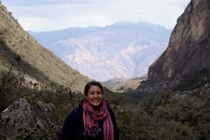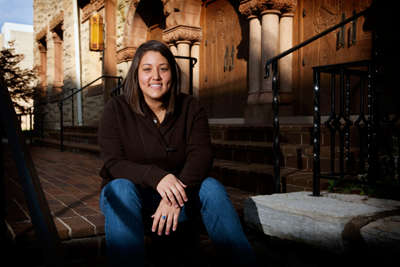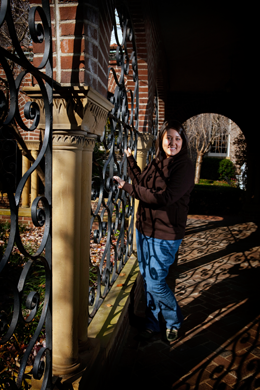Rebecca Linares
by Megan Neff
photos by Mark Cornelison
More than 3,000 miles stand between Lexington, Ky. and Carhuaz, Peru.
But to Rebecca Linares, the city and Latin America as a whole are not just exotic vacation destinations; they are tangible entities whose interests and culture are directly and firmly tied to the United States. And her work is aimed at showing how.
Linares left Louisville in 2006 bound for Midway College. After realizing that the school’s selection of courses would not satisfy her ambitious goals, she transferred to the University of Kentucky in 2007. Here, she tailored her plans into a Spanish and Latin American Studies/International Studies double major.
With a Peruvian father and Spanish-Cuban mother, Linares’ ties to Latin America run deep. What began as a childhood in a culturally diverse household, developed into an avid interest in multicultural issues that would become the focus of her community service, travels and undergraduate academic career.
Over the summer, Linares traveled to Carhuaz, a town in the region of Ancash located in the Callejón de Huaylas, which she describes as "a beautiful valley in the Peruvian highlands.”

Linares hiking in the Calejón de Huaylas
This was not her first trip to Peru. Before, she had made other trips to visit family and to get to know the country. This time, however, she would not be paying visits to relatives, but instead studying the people and a vital aspect of their culture: the Quechuan language.
The four-week program, which Linares found through the International Studies Program, provided her with an anthropology field school in which she studied the impact of teaching Quechua in schools throughout the region.
“Before I began studying Quechua, I did not really realize how important it is, not just as an endangered language, but also as a way of life for millions of people who speak it,” said Linares.
Linares immersed herself in the culture for the short duration of the program, observing and talking with students and teachers at three schools in the area, including a Spanish immersion school, a Quechua immersion school and a bilingual school that taught both Quechua and Spanish.

Her research showed that schools which included Quechua in their curriculum could relate better to their students. Linares believes this is because the Quechuan lexicon is more reflective of the Andean culture than Spanish.
“Quechua, and Andean culture really affect how people think, interact and view the world,” said Linares. “Quechua isn’t just a language. It’s tied into the Andean culture.”
Since returning to the states, Linares has continued to study Quechua and its role in Andean culture. She will be involved in a symposium held by the International Studies Program during Hispanic Heritage month that will focus on indigenous cultures in Latin America.
But Linares’ interests go beyond her academic research on the Quechuan language. In Lexington, she has also worked on refugee resettlement with Kentucky Refugee Ministries and volunteers with English-as-a-Second-Language (ESL) programs at two Lexington schools, Morton Middle and Cassidy Elementary.
For Linares, her list of accomplishments, which includes research in cultural protocol and accessibility to social services, is not an exhaustive record – it is a testament to where she has been, and where she will go.
Post-graduation, Linares has her eye on a couple of graduate schools, all with Quechua programs. And though the plan is not concrete, ideas are already swirling in her head about what she wants to research.

One idea is to study the effects of the United States–Peru Trade Promotion Agreement, a bilateral free trade agreement implemented in February of 2009. Specifically, she wants to see how it will affect people living in rural parts of Peru.
To many undergraduates, who find the stress of balancing a heavy course load stressful enough, Linares’ involvement may seem overwhelming. But she sees it as a way to efficiently prioritize what matters most.
“I have discovered the issues that I care the most about and that is where and how I spend my time,” said Linares. “I have also realized that when I am doing something I really care about, it does not seem stressful to be so busy."
Whether it be appreciating personal heritage, and that of others; of not only understanding US foreign trade policy, but also seeing how it affects the lives of those a mere 3,000 miles away, Linares’ work reflects the reality that we live in a culture of intense globalization, and the call to do better at embracing it.
by Megan Neff
photos by Mark Cornelison
